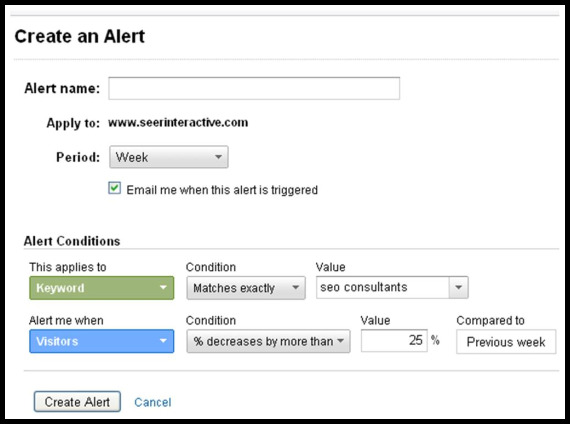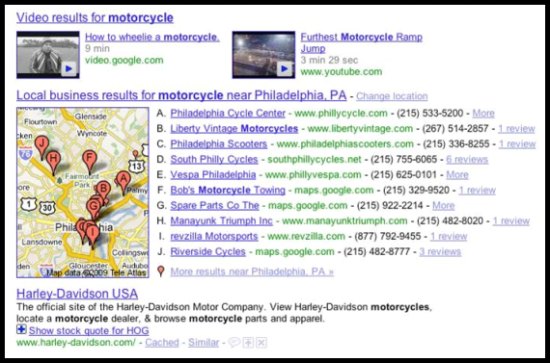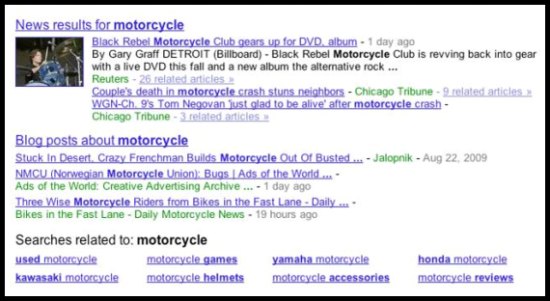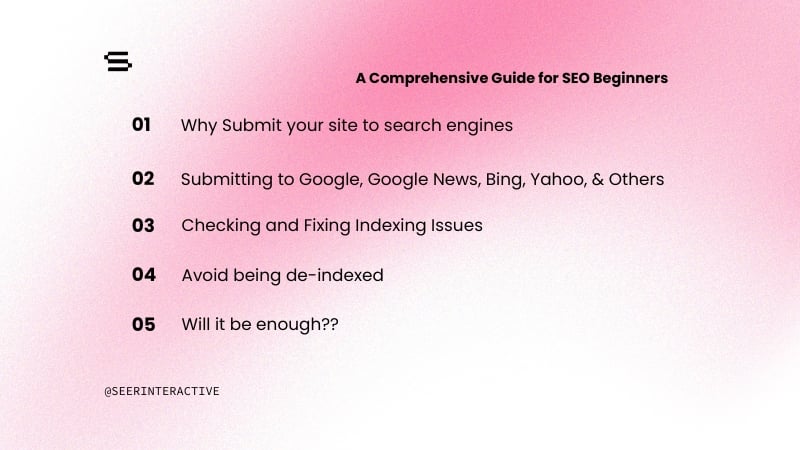Nothing (other than flying) scares me more than seeing a massive drop (whether immediate or over a 6 month period) in traffic and conversions for a client from unbranded natural search. Sometimes this can be explained by great PR / appearances on TV that caused a spike for a few days, but when that is NOT the case I get worried.
All of us have been there, we dig in and start troubleshooting, looking backwards, checking for things like: 1 - Did the client undo something? No. 2 Is there less search volume for the keyword? No. 3 - Is Google caching the wrong page? No. 4 - Did a bunch of competitors do something to boost their sites? No. 5 - Did the client site get hacked with some kind of PHP injection cloaking scheme? No. 6 are we in some kind of bad link neighborhood and got penalized? No.
UNIVERSAL SEARCH MONSTER gobbling up rankings?

Then you realize sometimes it is the UNIVERSAL SEARCH MONSTER gobbling up your rankings and leaving your #5, #8 or #10 ranking as a lifeless, useless, shadow of its former self.
The issue with universal search is that Google is changing it up all the time, for instance here is an SEO roundtable post on Google removing local results for SEO queries for the last 18 month or so that wasnt the case.
Suddenly our same ranking for local queries has more value. the local results were gone.
Once Google incorporated local search results for words like Philadelphia SEO company, it immediately devalued our top ranking for that term because the 5 local results were above us (even though one of them was a Korean Man, 4 of the results were companies doing SEO). Depending on the day wed be up there sometimes in the local and sometimes not.
The question you should be thinking, is how can I know when universal search changes are made and how do I determine the impact that that those changes had on rankings, clicks, and conversions?
You can use Raven or any SERP tracker that captures a copy of the Google/Yahoo/Bing results page to triangulate the data points and take a good educated guess. Heres how.
STEP 1 Set up your analytics tool to alert you anytime conversions from a keyword drop by more than 25% over a 1 month period, this is quite easy with Google Analytics Intelligence (Beta)

I would recommend using no more than 20 or so keywords, at least in the beginning. You want to select only some of your top traffic driving keywords or youll end up with too many alerts sometimes for a word that drove 4 conversions last month and drove 3 this month which if you have a site that has hundreds or thousands of conversions per month youll flood your own inbox. Rendering this kind of intelligence useless.
Note: use your own % decrease I just like 25% as a starter, in the same way 20 might not be the ideal number of keywords, but they are good places to start.
STEP 2 Once the alert catches a keyword that is not performing as well as it once did (in terms of driving traffic) do your regular checks as mentioned above, for changes the client didnt tell you about, decreases in search volume, hacks, etc. If none of them are the culprit then move on to step 3.
STEP 3 You got a keyword that fits the criteria no one; this is where your SERP tracker that captures images of the actual results page becomes a critical feature in your reverse engineering of what happened. I would start looking back historically at the previous SERPS. This hopefully will illustrate if universal search has become more prevalent over time, which could cause your same ranking to not drive the traffic and sales it once did, even though the ranking is the same. This is precisely why analyzing rankings is sooo 2002. The ranking NEVER moves, the impact that ranking had just fell through the floor.
If you are only analyzing rankings you'll never catch this.
One very important thing to keep in mind in this analysis is to use top converting keywords, not top traffic driving keywords. Why? Simple, take the word motorcycle, which is a HUGE universal search result.


If you had the #5 result a year ago you are probably on page 2 now, which will hurt traffic tremendously.
Should you go out and create a ton of new content, shoot videos, develop link bait strategies, etc to get back on page 1 for the word motorcycle? Probably not, if that keyword didnt convert well for you. That is the big IF.
So be smart with it, don't go out wasting your time, but when universal starts impacting rankings, traffic, and conversions you'll need to get crackin' and hopefully I've just given you some ways to battle the universal search monster.


